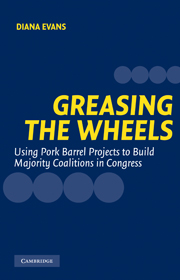Book contents
- Frontmatter
- Contents
- List of Tables and Figures
- Acknowledgments
- 1 Introduction
- 2 Pork Barrel Politics and General Interest Legislation
- 3 Who Calls the Shots? The Allocation of Pork Barrel Projects
- 4 Highway Demonstration Projects and Voting on the Federal Highway Program
- 5 Presidential Bargaining with Congress: The NAFTA Bazaar
- 6 Pork Barreling in the Senate: Do Both Parties Do It?
- 7 Conclusions
- References
- Index
3 - Who Calls the Shots? The Allocation of Pork Barrel Projects
Published online by Cambridge University Press: 18 November 2009
- Frontmatter
- Contents
- List of Tables and Figures
- Acknowledgments
- 1 Introduction
- 2 Pork Barrel Politics and General Interest Legislation
- 3 Who Calls the Shots? The Allocation of Pork Barrel Projects
- 4 Highway Demonstration Projects and Voting on the Federal Highway Program
- 5 Presidential Bargaining with Congress: The NAFTA Bazaar
- 6 Pork Barreling in the Senate: Do Both Parties Do It?
- 7 Conclusions
- References
- Index
Summary
All congressmen would score pork if they had the power. But the big guys eat first, then toss leftover scraps to those they favor. And because everyone wants it, a sort of balance of terror emerges where no one will challenge the porkers because they want theirs someday.
(Kelly 1992, p. 6)Underlying that remark from a member of the White House staff is the assumption that the leaders who dispense pork barrel benefits exercise tight control over the process. This chapter investigates the extent to which that was actually the case in one committee in the House: the Public Works and Transportation Committee, which distributed projects to create majority coalitions for general interest legislation.
It is also clear from the quotation above that some members of Congress are thought to occupy especially advantageous positions from which to do distributive favors for their fellow legislators. Chief among them are committee and subcommittee leaders whose jurisdictions are conducive to the authoritative distribution of pork. By “authoritative distribution” I mean that the committees can actually commit funds rather than merely authorize them; authorization by itself normally does not assure that the money will ever be appropriated and spent. In addition, the tax-writing committees in both houses of Congress have the ability to confer benefits in the form of special tax treatment, which they have been more than willing to do in order to pass their favored broad-based tax legislation, most famously the 1986 overhaul of the federal tax code (Birnbaum and Murray 1987).
- Type
- Chapter
- Information
- Greasing the WheelsUsing Pork Barrel Projects to Build Majority Coalitions in Congress, pp. 57 - 89Publisher: Cambridge University PressPrint publication year: 2004



